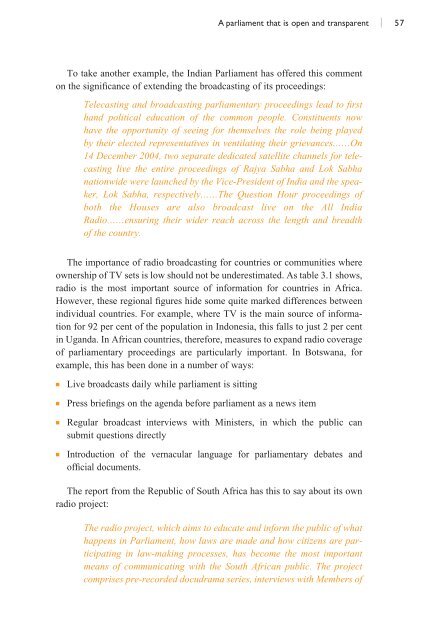PARLIAMENT AND DEMOCRACY - Inter-Parliamentary Union
PARLIAMENT AND DEMOCRACY - Inter-Parliamentary Union
PARLIAMENT AND DEMOCRACY - Inter-Parliamentary Union
Create successful ePaper yourself
Turn your PDF publications into a flip-book with our unique Google optimized e-Paper software.
To take another example, the Indian Parliament has offered this comment<br />
on the significance of extending the broadcasting of its proceedings:<br />
Telecasting and broadcasting parliamentary proceedings lead to first<br />
hand political education of the common people. Constituents now<br />
have the opportunity of seeing for themselves the role being played<br />
by their elected representatives in ventilating their grievances……On<br />
14 December 2004, two separate dedicated satellite channels for telecasting<br />
live the entire proceedings of Rajya Sabha and Lok Sabha<br />
nationwide were launched by the Vice-President of India and the speaker,<br />
Lok Sabha, respectively……The Question Hour proceedings of<br />
both the Houses are also broadcast live on the All India<br />
Radio……ensuring their wider reach across the length and breadth<br />
of the country.<br />
The importance of radio broadcasting for countries or communities where<br />
ownership of TV sets is low should not be underestimated. As table 3.1 shows,<br />
radio is the most important source of information for countries in Africa.<br />
However, these regional figures hide some quite marked differences between<br />
individual countries. For example, where TV is the main source of information<br />
for 92 per cent of the population in Indonesia, this falls to just 2 per cent<br />
in Uganda. In African countries, therefore, measures to expand radio coverage<br />
of parliamentary proceedings are particularly important. In Botswana, for<br />
example, this has been done in a number of ways:<br />
■ Live broadcasts daily while parliament is sitting<br />
A parliament that is open and transparent I 57<br />
■ Press briefings on the agenda before parliament as a news item<br />
■ Regular broadcast interviews with Ministers, in which the public can<br />
submit questions directly<br />
■ Introduction of the vernacular language for parliamentary debates and<br />
official documents.<br />
The report from the Republic of South Africa has this to say about its own<br />
radio project:<br />
The radio project, which aims to educate and inform the public of what<br />
happens in Parliament, how laws are made and how citizens are participating<br />
in law-making processes, has become the most important<br />
means of communicating with the South African public. The project<br />
comprises pre-recorded docudrama series, interviews with Members of

















